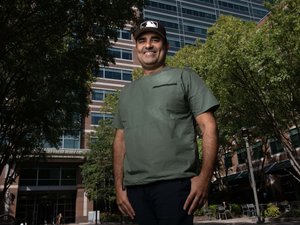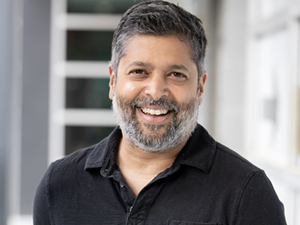
Atlanta-native Jack Griffin, 19, a junior at University of Michigan working toward a major in business administration and minor in community action and social change, is more than your average college student.
He's also the founder of FoodFinder, a website and mobile application dedicated to helping food insecure families and others find local assistance instantly.
"People always ask how I manage being a student with working out FoodFinder, and I always say, 'I’ll let you know when I figure it out,'" he told Atlanta Inno in an interview earlier this week.
After watching a news program in March 2013 about families living in poverty who struggled to find their next meal, Griffin, a high school sophomore at the time, said he wanted to do more to help in his community in Gwinnett County.
"I was watching the story, seeing middle school-aged children who had to get ready for school in the bathrooms of public libraries and gas stations," he said. "I thought, 'This is something that I never had to worry about to the scope and the extent of the issues that these kids had to deal with on a day to day basis.'"
But when Griffin tried to find places to volunteer in his hometown, the task of finding food shelters and pantries near him was tougher than he expected.
"That’s when I realized that if I’m having as much trouble as a regular kid, what if I was someone who needed the assistance being offered at the food pantries I was looking for," he said. "And that’s pretty much how I had the idea to instead of just volunteering somewhere, actually create something that would save people in need of this assistance all that time and energy when searching for places to get extra food assistance."
Thus, the idea for FoodFinder was born. After the initial launch in May 2014, the site and app have grown from including 100 food pantries in Gwinnett County to offering information on more than 25,000 food pantries across all 50 states.
"That 25,000 is still about 50 percent of the total estimated figure of 50,000 food pantries, emergency kitchens and shelters that are in existence in America, so we’re going to be working toward that and hopefully we will achieve that 100 percent level of coverage and offer the information of all 50,000 in 2018," Griffin said.
Being on the green side of the innovator crowd has its perks and drawbacks, Griffin said. He was too young to drive himself to attend the first meetings with food assistance programs and movers and shakers in the non-profit industry when FoodFinder started, but the support from friends, family and those who believe in his mission have been enough to propel him forward.
"It’s been great to have people be supportive of me and my efforts but also on the flip side of that, being as young as I am, there obviously are sort of inevitable [instances] when people question how much can [I] really do... And I know we got told, especially really early on that we can hardly cover the information of all food pantries in Georgia, much less the entire country," he said.
Since launching his startup, Griffin said the lessons he's learned include the importance of listening and truly considering someone's circumstances without assumptions and biases. Despite critiques from some who question if the technology is appropriate for helping those who can't find food throughout the year, he said there is a need for connecting the dots to food pantries in someone's community.
"I really saw that the current food assistance landscape was really established, obviously the food pantries themselves are doing tremendous needed work, but a lot of times, managing their online presence and doing that sort of awareness building, wasn’t often in their capability," he said. "So I saw the need for FoodFinder that was surprisingly acceptable by food insecure families through the use of schools and through advocates like teachers and counselors and social workers that do have technology and want the best for these families... If the technology has such a potential to do real good and to help people, then the people that have the most to gain from that knowledge and that connectivity, they shouldn’t be ignored."
Though he's working on his undergrad at University of Michigan and battling the bitter Midwestern winters, Griffin said he has every intention of returning to Atlanta after finishing his education.
"I really appreciate not only the energy around the city and the social aspect of it, but even on the entrepreneurial side, and all the startups and overly great work being done by businesses and companies young and old within the city and really making it a tremendous place for people to work and live," he said.








